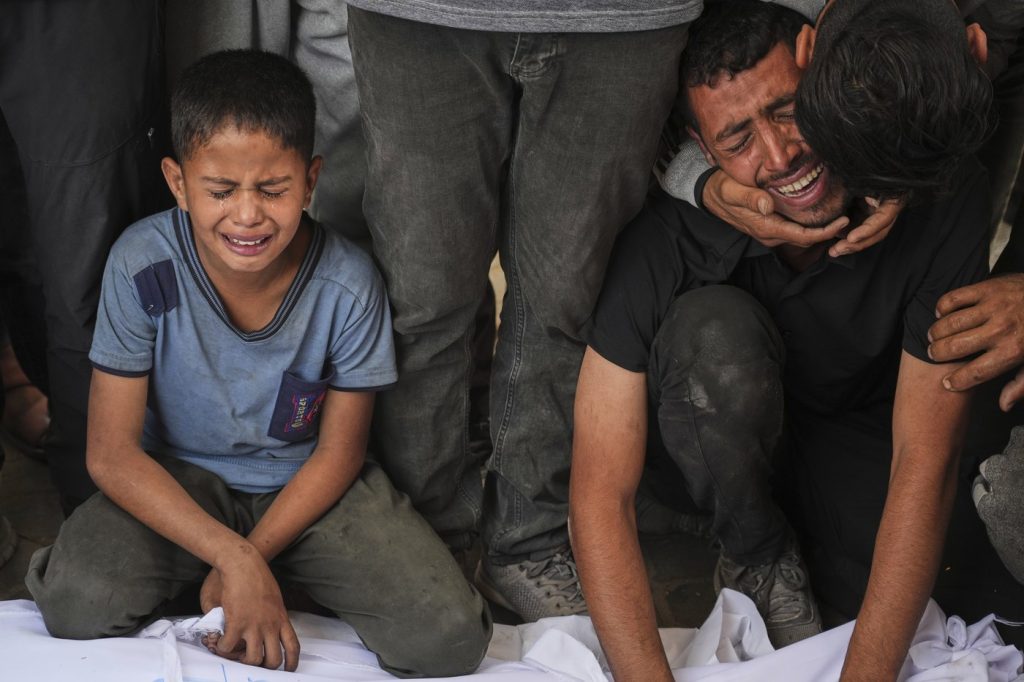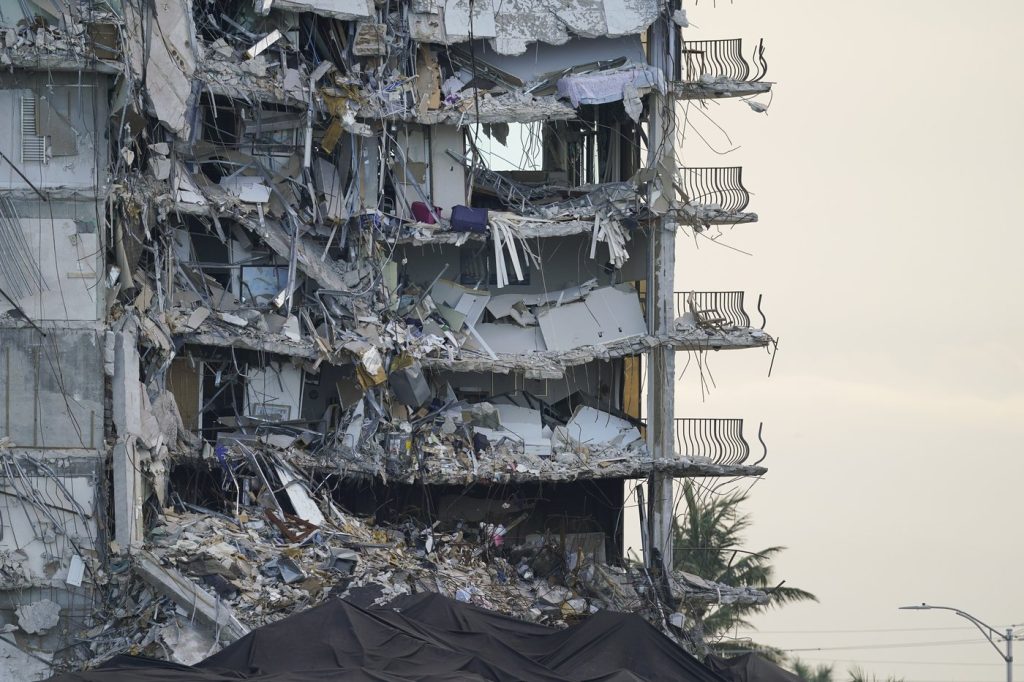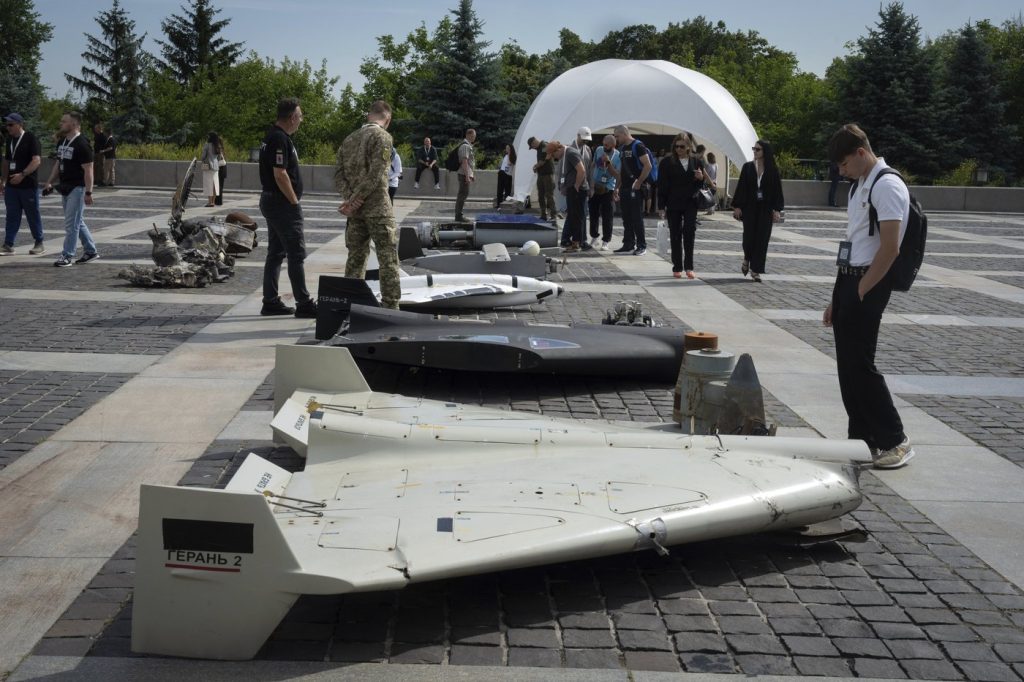DEIR AL-BALAH, Gaza Strip (AP) – A series of Israeli strikes have resulted in the deaths of at least 72 people across Gaza overnight, according to health workers. As the ongoing conflict enters its 21st month, prospects for a ceasefire appeared to be improving.
Among the casualties were three children and their parents, who were killed in an Israeli strike on a tent camp in Muwasi, located near the southern city of Khan Younis. Relatives described the tragic incident, stating that the family was asleep when the attack occurred. The children's grandmother, Suad Abu Teima, expressed her anguish, questioning, “What did these children do to them? What is their fault?” Mourners paid their respects by placing red flowers into the victims' body bags.
In addition to the family, another 12 individuals lost their lives near the Palestine Stadium in Gaza City, which had been sheltering displaced persons. Eight more fatalities were reported in residential apartments, while over 20 bodies were taken to Nasser Hospital. Additional attacks included a midday strike that claimed 11 lives on a street in eastern Gaza City and another strike that killed eight individuals, including five children, according to Al-Ahli Hospital. A gathering at the entrance of the Bureij refugee camp in central Gaza also resulted in two deaths, as confirmed by Al-Awda Hospital.
Despite the recent violence, U.S. President Donald Trump indicated that there might be a ceasefire agreement within the upcoming week. During a press briefing, he mentioned, “We’re working on Gaza and trying to get it taken care of.” An anonymous source revealed that Israeli Minister for Strategic Affairs Ron Dermer is scheduled to travel to Washington next week to discuss the ceasefire alongside Iran and other matters.
Indirect negotiations between Israel and Hamas have intermittently taken place since a ceasefire was broken in March, with Israeli military operations exacerbating the humanitarian crisis in Gaza. Approximately 50 hostages remain in the territory, with fewer than half believed to still be alive. These individuals were among the 251 hostages taken during Hamas’s attack on Israel on October 7, 2023, which ignited the conflict.
Yotam Cohen, brother of hostage Nimrod Cohen, raised poignant questions regarding the violence, stating, “What more is left to do in Gaza that has not already been done? Who else is left to eliminate?” Weekly rallies by families and supporters are ongoing, as they demand clarity on the situation regarding their loved ones.
Since the latest ceasefire ended, the war has claimed the lives of over 56,000 Palestinians, per data from the Health Ministry, which does not differentiate between civilians and combatants. The Ministry estimates that more than half of the deceased are women and children, with 6,089 killed following the collapse of the recent ceasefire.
Israel maintains that it targets militants and attributes civilian casualties to Hamas, claiming that militants often operate within civilian areas. In the wake of the suffering, families of hostages remain hopeful that Trump’s involvement in securing a ceasefire with Iran may lead to increased pressure to broker a similar deal regarding Gaza. Prime Minister Benjamin Netanyahu currently enjoys substantial public support for the conflict with Iran, which may afford him greater freedom to address the situation in Gaza, despite opposition from his far-right allies.
Hamas has expressed its willingness to release all hostages in exchange for a ceasefire in Gaza; however, Netanyahu has countered that he will only conclude the conflict once Hamas is disarmed and expelled, a condition that Hamas has rejected.
The dire humanitarian situation in Gaza continues to unfold as thousands of Palestinians face acute hunger. After Israel blocked all food access for over two months, only minimal supplies have been permitted into the territory since mid-May. According to Gaza’s Health Ministry, more than 500 Palestinians have died and many more have been injured while seeking food since the Gaza Humanitarian Foundation began its aid distribution approximately a month ago.
Witnesses report that Israeli troops have opened fire on crowds approaching feeding sites, while the military claims it only issued warning shots and is investigating incidents involving civilian casualties. Thousands of Palestinians are forced to travel for hours, navigating through areas controlled by the Israeli military, to access essential supplies.
Simultaneously, United Nations efforts to provide limited food supplies have encountered numerous challenges, including armed gangs looting trucks and waves of desperate individuals attempting to seize aid from convoys. Recently, Saturday’s death toll included two individuals killed by Israeli gunfire while awaiting aid near the Netzarim corridor, as confirmed by Al-Shifa and Al-Awda hospitals.
No immediate comment has been made by the Israeli military regarding these incidents.












